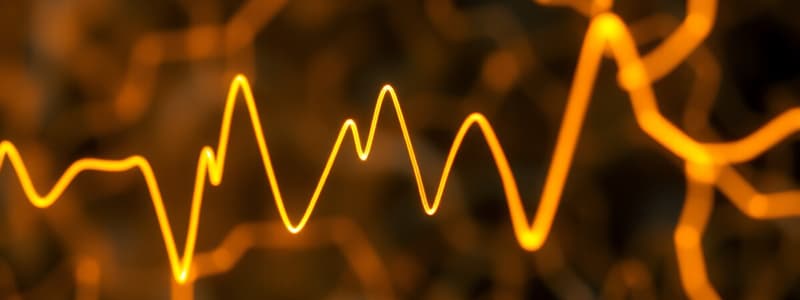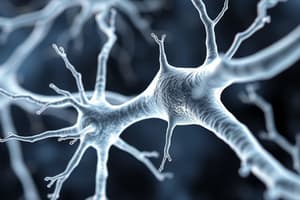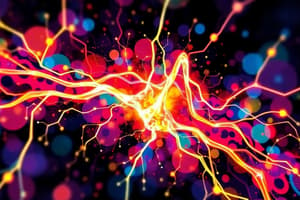Podcast
Questions and Answers
What triggers the opening of voltage-gated Na+ channels during the depolarization phase of an action potential?
What triggers the opening of voltage-gated Na+ channels during the depolarization phase of an action potential?
- Decrease in Na+ concentration outside the cell
- Inactivation of K+ channels
- Increased permeability of K+ ions
- Membrane potential reaching the threshold (correct)
Which characteristic of action potentials reflects the all-or-none principle?
Which characteristic of action potentials reflects the all-or-none principle?
- Action potentials can be graded in strength
- Action potentials only occur in response to strong stimuli
- Action potentials can vary in size depending on the stimulus strength
- Action potentials are always the same amplitude and duration (correct)
What occurs during the absolute refractory period of an action potential?
What occurs during the absolute refractory period of an action potential?
- K+ channels close enabling excitability.
- Na+ channels are inactive and cannot be opened. (correct)
- The membrane is in a state of depolarization.
- Action potentials can be generated with weaker stimuli.
How does hyperpolarization affect the membrane potential?
How does hyperpolarization affect the membrane potential?
What interrupts the positive feedback loop during the rising phase of the action potential?
What interrupts the positive feedback loop during the rising phase of the action potential?
Which statement correctly describes the all-or-none principle?
Which statement correctly describes the all-or-none principle?
What is a primary function of voltage-gated K+ channels during the repolarization phase?
What is a primary function of voltage-gated K+ channels during the repolarization phase?
During the refractory period, what is the state of the voltage-gated Na+ channels?
During the refractory period, what is the state of the voltage-gated Na+ channels?
During which period can an action potential be triggered only by stronger than normal stimuli?
During which period can an action potential be triggered only by stronger than normal stimuli?
What happens to the membrane potential during hyperpolarization?
What happens to the membrane potential during hyperpolarization?
What primarily causes the refractory periods following an action potential?
What primarily causes the refractory periods following an action potential?
What effect does a greater intensity of stimulation have on action potential frequency?
What effect does a greater intensity of stimulation have on action potential frequency?
What is the role of the slow response of voltage-gated K+ channels during an action potential?
What is the role of the slow response of voltage-gated K+ channels during an action potential?
Which of the following best describes the role of voltage-gated channels during the action potential?
Which of the following best describes the role of voltage-gated channels during the action potential?
What occurs immediately after an action potential is generated?
What occurs immediately after an action potential is generated?
What happens to the K+ channels by the end of hyperpolarization?
What happens to the K+ channels by the end of hyperpolarization?
What is the primary function of voltage-gated Na+ and K+ channels during an action potential?
What is the primary function of voltage-gated Na+ and K+ channels during an action potential?
During which phase of the action potential does the membrane potential reach its highest value?
During which phase of the action potential does the membrane potential reach its highest value?
Which statement best describes the all-or-none principle in action potentials?
Which statement best describes the all-or-none principle in action potentials?
What characterizes the refractory period during and after an action potential?
What characterizes the refractory period during and after an action potential?
What effect does hyperpolarization have on a neuron?
What effect does hyperpolarization have on a neuron?
Which of the following correctly describes the sequence of ionic movements during the action potential?
Which of the following correctly describes the sequence of ionic movements during the action potential?
Which of these best defines the threshold potential in neurons?
Which of these best defines the threshold potential in neurons?
How does the sodium-potassium pump contribute to the action potential process?
How does the sodium-potassium pump contribute to the action potential process?
Flashcards are hidden until you start studying
Study Notes
Action Potential
- An action potential, a rapid change in membrane potential, is generated at the threshold
- The minimum amount of depolarization needed to trigger an action potential is called the threshold, typically -55mV
- Action potentials are all-or-none events, meaning they either occur fully or not at all
- The amplitude and duration of action potentials are consistent
- Weak stimuli don't produce an action potential
Depolarization
- Depolarization, where the cell becomes more positive, starts when the threshold is reached
- This opens voltage-gated sodium (Na+) channels, allowing more Na+ to flow into the cell
- Increased Na+ influx further depolarizes the cell, opening more Na+ channels creating a positive feedback loop
- This positive feedback loop drives the rising phase of the action potential
Repolarization
- The rising phase of the action potential ends when the positive feedback loop is interrupted:
- Voltage-gated Na+ channels inactivate after a certain time, closing
- Voltage-gated potassium (K+) channels, responding slowly to depolarization, start to open
- The slow opening of K+ channels allows K+ to move out of the cell, making the cell more negative (repolarizing)
- The membrane potential becomes more negative than the resting membrane potential, a state called hyperpolarization
Refractory Period
- The action potential is followed by a refractory period, a brief period of decreased excitability
- The refractory period is divided into two phases:
- Absolute refractory period: the cell cannot be stimulated to fire another action potential, regardless of stimulus strength
- Relative refractory period: the cell can be stimulated to fire another action potential, but only by a stronger stimulus than usual
- The refractory periods are caused by the inactivation of Na+ channels and increased opening of K+ channels
All-or-None Principle
- Action potential amplitude is independent of the stimulus strength.
- A stronger stimulus does not produce a larger action potential but can trigger more frequent firing.
Action Potential Conduction
- Electrical currents across cell membranes are carried by ions like sodium (Na+) and potassium (K+)
Action Potential Initiation
- Signals from dendrites and the cell body reach the axon hillock
- If these signals cause the membrane potential at the axon hillock to depolarize past the threshold, an action potential is triggered
Nobel Prize in Physiology or Medicine (1963)
- Alan L. Hodgkin and Andrew F. Huxley shared the Nobel Prize in Physiology or Medicine for their quantitative description of the ionic currents involved in the action potential.
- They used voltage-clamp recordings to study the ionic currents in the squid giant axon.
Threshold
- If the stimulus reaching the axon hillock is strong enough, the neuron depolarizes by approximately 15mV and reaches the threshold.
Studying That Suits You
Use AI to generate personalized quizzes and flashcards to suit your learning preferences.




